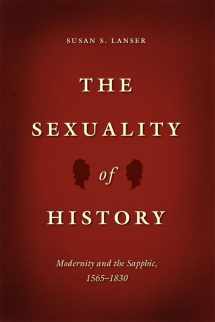
The Sexuality of History: Modernity and the Sapphic, 1565-1830
ISBN-13:
9780226187563
ISBN-10:
022618756X
Edition:
Illustrated
Author:
Susan S. Lanser
Publication date:
2014
Publisher:
University of Chicago Press
Format:
Hardcover
344 pages
FREE US shipping
Book details
ISBN-13:
9780226187563
ISBN-10:
022618756X
Edition:
Illustrated
Author:
Susan S. Lanser
Publication date:
2014
Publisher:
University of Chicago Press
Format:
Hardcover
344 pages
Summary
The Sexuality of History: Modernity and the Sapphic, 1565-1830 (ISBN-13: 9780226187563 and ISBN-10: 022618756X), written by authors
Susan S. Lanser, was published by University of Chicago Press in 2014.
With an overall rating of 4.3 stars, it's a notable title among other
books. You can easily purchase or rent The Sexuality of History: Modernity and the Sapphic, 1565-1830 (Hardcover) from BooksRun,
along with many other new and used
books
and textbooks.
And, if you're looking to sell your copy, our current buyback offer is $0.53.
Description
The period of reform, revolution, and reaction that characterized seventeenth- and eighteenth-century Europe also witnessed an intensified interest in lesbians. In scientific treatises and orientalist travelogues, in French court gossip and Dutch court records, in passionate verse, in the rising novel, and in cross-dressed flirtations on the English and Spanish stage, poets, playwrights, philosophers, and physicians were placing sapphic relations before the public eye. In The Sexuality of History, Susan S. Lanser shows how intimacies between women became harbingers of the modern, bringing the sapphic into the mainstream of some of the most significant events in Western Europe. Ideas about female same-sex relations became a focal point for intellectual and cultural contests between authority and liberty, power and difference, desire and duty, mobility and change, order and governance. Lanser explores the ways in which a historically specific interest in lesbians intersected with, and stimulated, systemic concerns that would seem to have little to do with sexuality. Departing from the prevailing trend of queer reading whereby scholars ferret out hidden content in closeted” texts, Lanser situates overtly erotic representations within wider spheres of interest. The Sexuality of History shows that just as we can understand sexuality by studying the past, so too can we understand the past by studying sexuality.


We would LOVE it if you could help us and other readers by reviewing the book
Book review

Congratulations! We have received your book review.
{user}
{createdAt}
by {truncated_author}


